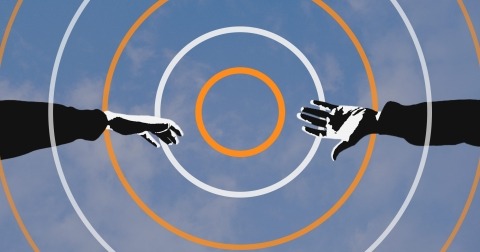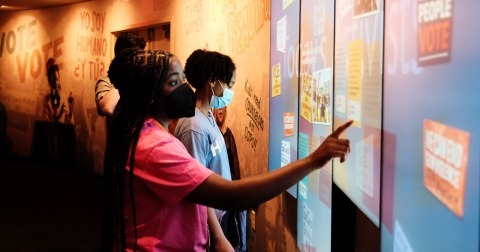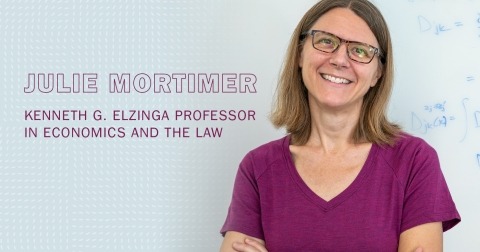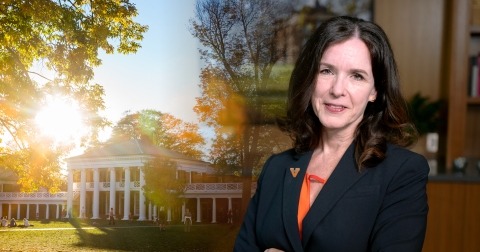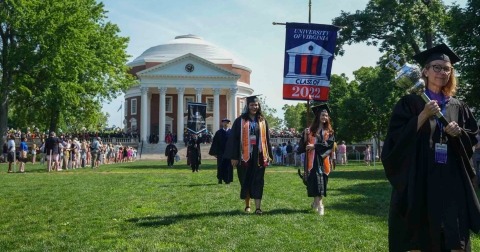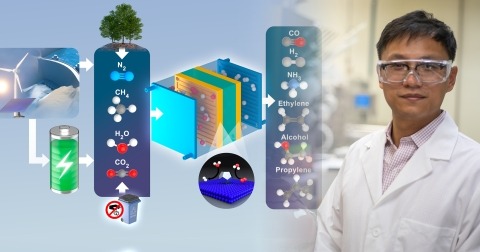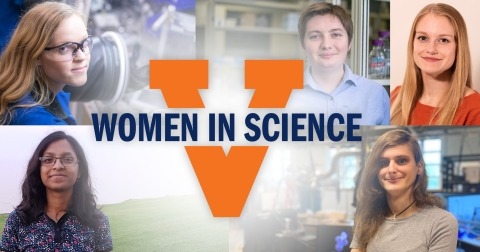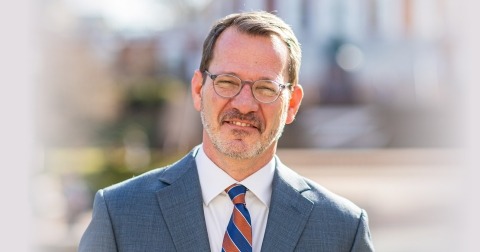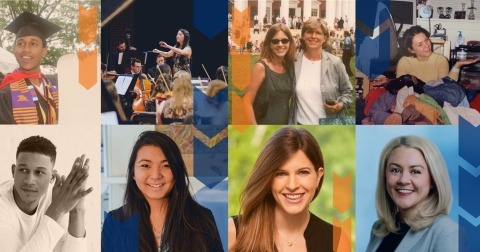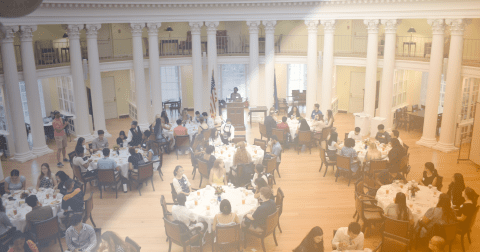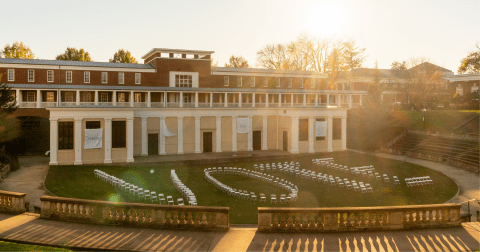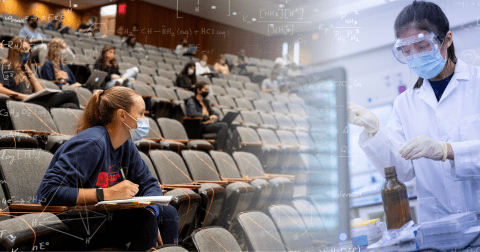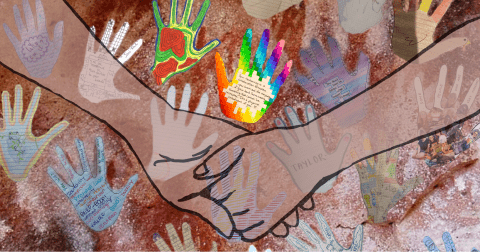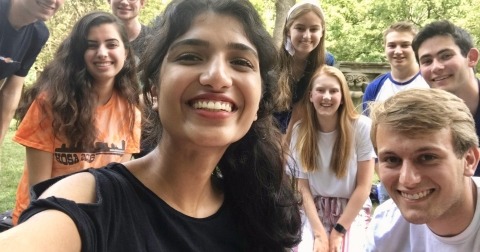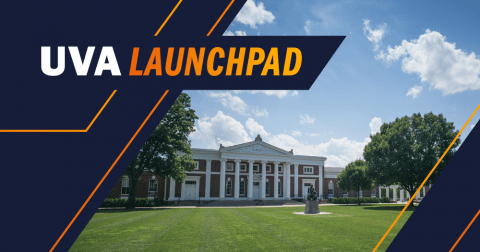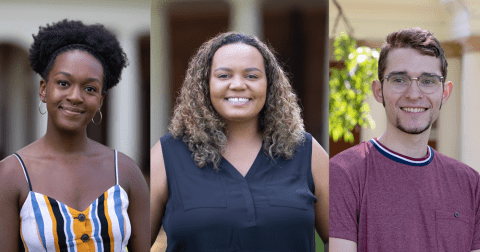Acampora, a Virginia native, comes to UVA from Emory University in Atlanta, Georgia where she served as deputy provost and professor of philosophy. Prior to Emory, she was a full professor at Hunter College and the City University of New York’s Graduate Center and served as Hunter’s associate provost for faculty affairs and research.
At Emory, Acampora managed a wide slate of strategic and budgetary priorities related to the academic mission, overseeing academic program development, faculty recruitment and retention, and initiatives in support of undergraduate flourishing–including student innovation and career advising. Acampora is also an acclaimed philosopher and expert in modern European philosophy, moral psychology, and aesthetics.
We recently spoke with the new dean to learn more about her background, her passion for liberal arts education and how she’s settling into her new role.
Q. What drew you to UVA?
A. UVA has the extraordinary excellence of a major research university that was born from a powerful idea—educating the public to participate in a democratic experiment of world-historic significance. The opportunity to lead from its core in Arts & Sciences was simply irresistible, and so was the idea of being part of a highly distinguished public university. I spent the first twenty years of my academic career in public research institutions, and this mission greatly appeals to me.
I’m also thrilled to be part of the vital role that Arts & Sciences has in making UVA a great and good university. I care deeply about the transformative power of a liberal arts and sciences education, which I think matters more now than ever. For us to provide a second-to-none education for our students and knowledge to help us solve some of the world’s intractable problems for the benefit of the Commonwealth of Virginia, the nation, and the world, our teaching, research, and service missions must be strategically aligned. I see that as a core responsibility for the dean.
Dean Acampora shares her thoughts on the power of a liberal arts and sciences education at UVA at this moment in history.
Q. You’re from the Commonwealth, born in Roanoke and raised in Dublin, Virginia. How did growing up in Virginia shape you and your decision to pursue a career in higher education? And what are you most looking forward to as you move back to your home state?
A. My family tree on my mother’s side traces back centuries in Virginia, before the American Revolution. However, I’m the first in the family line to go to college. At the time, being a first-generation college student wasn’t something I thought about a lot. Looking back, I know it shaped my life significantly.
I received an extraordinary liberal arts education at Hollins University that put me on the path to higher education. While there, I fell in love with research and received my first federal grant to examine the passage of the Virginia Bill for Religious Freedom, the key ideas that were the basis of the First Amendment. Good advising experiences led me to discover a passion I didn’t even know I had at the time—philosophy. I was fascinated by the power of logic and argumentation and by thinking about big ideas—as well as learning new ways of thinking and exploration. Now, as an academic leader, I love to see how all the elements of discovery fit together.
Coming home to Virginia, I’m looking forward to bringing together my experiences growing up in the area with the knowledge and perspective I have now as a long-serving faculty member and senior university leader to address key issues. What do our students need in the future? How can UVA enhance their opportunities and help the Commonwealth and our larger nation and world become both great and good? As people, we face some enormous challenges and opportunities, and I believe our faculty, staff, and students at UVA, together with our alumni, have the knowledge and know-how to help us understand and meet them.
Q. Tell us more about your perspective on why a liberal arts and sciences education matters more than ever, and how do you encourage students to embrace the full spectrum of its offerings?
A. When I say that I believe that education in the liberal arts and sciences matters more today than at any other time in human history, that isn’t hyperbole—I truly mean it.
Confronting and addressing the complex and urgent challenges we face today—and on a global scale with radically differential impacts—require the liberal arts and sciences. These challenges include the erosion of our democratic institutions and the communities of trust that are essential for supporting them; the demands for the realization of social justice; the inevitability of global climate change and the very different ways that will impact how and where people will live and work; massive public health challenges; the explosion of data; and emergence of synthetic biology, which will allow us to create new forms of life. These will challenge fundamental category distinctions that have guided our reflection and informed our decision-making. To understand, adapt, and meet these complex challenges, we need the liberal arts and sciences. We need a more capacious understanding of what is human, more than human, and humane—these are kindling for what can enliven and expand our senses of hope that we can do something.
In terms of how this connects to our students, I think the recently transformed College Curriculum is a great example. It’s a brilliant way to engage our future leaders with these realities—to learn how to ask the right questions, gain the knowledge and perspective across disciplines that prepares them to understand and manage complexity, and to take action on what they’ve learned.
Q. Do you have early thoughts on how you will build on the momentum in the College and potential areas of focus?
A. I think it’s vital that we preserve the liberal arts core as well as innovate. So what does that mean as I begin serving as dean?
My first area of focus is faculty hiring. I have spent many years learning about faculty recruitment and retention across virtually all disciplines, so I greatly appreciate their distinctive contributions and needs. I’ve also supported academic innovation and new program development and implementation, so I understand just how much work that entails and what it takes to build new things to scale. I’m working closely with the Arts & Sciences leadership team and the community more broadly to make sure we’re attracting the most talented teachers, scholars, researchers, and artists to join our remarkable faculty. I also want to be sure that we are keeping our current faculty here at UVA, so I’m working hard to ensure that this is a great place for faculty and staff to flourish. From there, we can do many things.
I also recognize that I have a lot to learn. I’m not coming into this role with specific new initiatives in mind. In fact, one of the most important things I need to do early on is learn about the many initiatives that are already underway so that I can support making them a reality and with genuine impact. I do think an outsider’s perspective on that can be valuable for leading reflection on how the exciting new efforts combine to strengthen the overall whole. The best new ideas for innovation will come from A&S colleagues and leaders from across the University.
Q. What challenges do you see in front of you, and how are you thinking about approaching them?
A. As I talk about getting to know the community, I’m acutely aware of the fact that, as UVA’s biggest school and the heart of the University, Arts & Sciences is a massive enterprise—getting to know the faculty, staff, and students will take some time. It’s vital for me to get out there to learn directly from my colleagues. I’m a firm believer that this is the best way to bring great ideas to life. Added to this, I know that the community of people who truly care about UVA and are committed to its future success, our alumni and supporters, is vast and greatly eager to connect. They are important to me as well, so I will need to balance my time meeting with and learning from all of these different groups.
Q. Regarding your academic and scholarly work, what aspects of philosophy do you explore?
A. I explore what philosophers call moral psychology. It’s similar to ethics, but instead of examining the bases for specific moral judgments, actions, or decisions, or forms of moral appraisal—such as whether something is good or bad, or right or wrong, or good or evil—moral psychology pursues questions about what makes us moral and how our moral experiences are informed by and connected with other forms of experience, such as cognition and our broader emotional lives. I am deeply interested in how all of this shapes our sense of our larger humanity and how we think about our shared opportunities and responsibilities in communities. A specific area of my interest is moral injury and arises from studies of veterans and their moral experiences both during and after war. In a nutshell, I look at various forms of moral breakdown in order to observe positive features of morality and help discover ways of promoting moral repair.
Q. What do you enjoy when you are not working?
A. I love to travel and have lived abroad, so I’m always game for a road trip, long-haul train experience, or new adventure. At last count, I think I’ve had the great fortune of visiting and learning from people in more than 50 countries.
I also enjoy being physically active and experiencing myself as a body-in-motion. I used to be a marathon runner and I got so much enjoyment from it. For my training, I would run from my home in Forest Hills, Queens, down the so-called “Boulevard of Death,” over the 59th Street Bridge, and up Lexington Avenue to get to Hunter College—or I would take a run with students around Central Park. But while rehabbing some overuse injuries, I discovered weight training, and now I am working on perfecting my handstand push-ups.
Reading has always been a deep form of pleasure for me, so I have plenty of adventures that arise from that. Most recently, while visiting family in Spain, I savored UVA poet extraordinaire Rita Dove’s Playlist for the Apocalypse.


